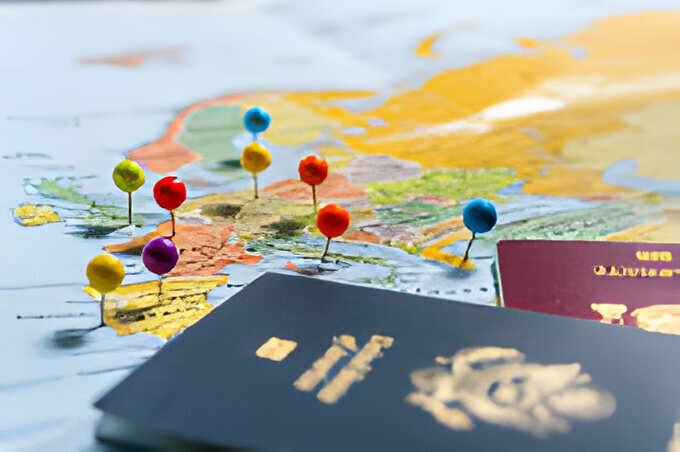How to Become a Digital Nomad: Earn While Traveling
Digital nomads are individuals who leverage technology to work remotely while traveling the world. They are free from the constraints of a traditional office job and can work from anywhere with an internet connection.
Becoming a digital nomad is a dream for many people who want to combine their love of travel with their career aspirations. However, it can be difficult to know where to start and how to make it a reality.
One of the key aspects of becoming a digital nomad is finding a way to earn a living while traveling. There are many different options available, from freelance writing and photography to web design and programming.
The key is to find a skill that can be done remotely and that is in demand in the digital marketplace. With the right skill set and a willingness to learn, it is possible to build a successful career as a digital nomad.
Read also: How Much Do Travel Nurses Make?
Who is a Digital Nomad?
A digital nomad is a person who uses technology to work remotely while traveling the world. This lifestyle allows individuals to work from anywhere with an internet connection, which means they can travel and explore new places while still earning an income.
Digital nomads can work in various fields, including writing, graphic design, programming, and online marketing.
Benefits and Challenges
The digital nomad lifestyle offers many benefits, including the freedom to work from anywhere, the opportunity to travel and experience different cultures, and the ability to create a work-life balance that suits individual needs.
However, this lifestyle also has its challenges, such as the need to constantly adapt to new environments, the lack of a stable income, and the potential for isolation and loneliness.
To become a successful digital nomad, one must have a strong work ethic, be self-motivated, and have excellent time management skills. It is also essential to have a reliable internet connection and to be able to work independently without constant supervision.
Read also: Remote Jobs in Canada: Opportunities, Requirements, and Benefits
Establishing a Remote Income
Becoming a digital nomad requires a reliable remote income that can support your travels. Here are three ways to establish a remote income:
1. Freelancing
Freelancing is a popular option for digital nomads. It involves offering your skills and services to clients on a project-by-project basis. Freelancers can work from anywhere in the world, as long as they have a reliable internet connection.
To become a successful freelancer, you need to identify your skills and find a niche market. You can use platforms like Upwork, Fiverr, and Freelancer to find clients. It’s also important to build a portfolio of your work and establish a good reputation through client reviews.
2. Remote Employment
Remote employment is another option for digital nomads. This involves working for a company that allows employees to work from anywhere in the world. Remote jobs can be found in a variety of industries, including tech, marketing, and customer service.
To find remote jobs, you can use job search engines like Indeed, Remote.co, and FlexJobs. It’s important to tailor your resume and cover letter to highlight your remote work experience and skills.
3. Online Business
Starting an online business can also provide a remote income for digital nomads. This involves creating a product or service that can be sold online. Online businesses can include e-commerce stores, digital products, and online courses.
To start an online business, you need to identify a profitable niche and create a product or service that solves a problem for your target audience. You can use platforms like Shopify, WooCommerce, and Teachable to set up your online business.
Establishing a remote income is crucial for becoming a digital nomad. Freelancing, remote employment, and online businesses are three ways to achieve this.
Practical Preparations for Nomadic Living
Financial Planning
Before embarking on a nomadic lifestyle, it’s important to have a solid financial plan in place. This includes creating a budget that takes into account all necessary expenses such as travel, accommodation, food, and other living costs. It’s also important to have a reliable source of income, whether it be through freelancing, remote work, or passive income streams.
To keep track of finances, it’s recommended to use tools such as budgeting apps, expense trackers, and online banking. It’s also a good idea to have a backup plan in case of emergencies, such as a savings account or emergency fund.
Legal and Tax Considerations
When living as a digital nomad, it’s important to understand the legal and tax implications of working and living in different countries. This includes obtaining necessary visas and work permits, registering with local authorities, and paying taxes in accordance with local laws.
To ensure compliance with all legal and tax requirements, it’s recommended to seek the advice of a qualified professional, such as a lawyer or accountant, who specializes in international tax and legal matters.
Healthcare and Insurance
Access to healthcare and insurance can vary greatly depending on the country or region in which a digital nomad is living. It’s important to research and understand the healthcare system and insurance options available in each location, and to obtain necessary vaccinations and medical supplies before traveling.
To ensure adequate coverage, it’s recommended to obtain travel insurance that includes medical coverage, as well as insurance for personal belongings and other potential risks. It’s also important to have a plan in place for emergency medical situations, such as knowing the location of nearby hospitals and medical facilities.
Mastering the Logistics of Travel
Choosing Destinations
One of the most exciting parts of being a digital nomad is the freedom to work from anywhere in the world. However, choosing the right destinations can make or break your experience.
When selecting a location, consider factors such as cost of living, internet connectivity, safety, and cultural experiences. Research the visa requirements and length of stay limitations for each country to avoid any issues.
Accommodation and Co-working Spaces
Digital nomads need a comfortable and productive workspace. Accommodation options such as Airbnb, hostels, and hotels can provide a temporary home. Co-working spaces offer a professional environment with reliable internet, networking opportunities, and a community of like-minded individuals. Do your research and book in advance to ensure availability and avoid any last-minute stress.
Packing and Gear Essentials
Packing for a digital nomad lifestyle requires careful planning. A reliable laptop, smartphone, and camera are essential tools for remote work and documenting your travels. Other must-have items include a universal adapter, noise-cancelling headphones, and a portable charger. Pack light and invest in quality gear that will last. Don’t forget to purchase travel insurance to protect your belongings and health while on the road.
Mastering the logistics of travel is crucial for digital nomads.
By choosing the right destinations, finding comfortable accommodation and co-working spaces, and packing the right gear, you can enjoy a successful and fulfilling remote work experience.





